人教版英语八年级上册答案导学案完整版
新人教版八年级上册英语导学案(全册)
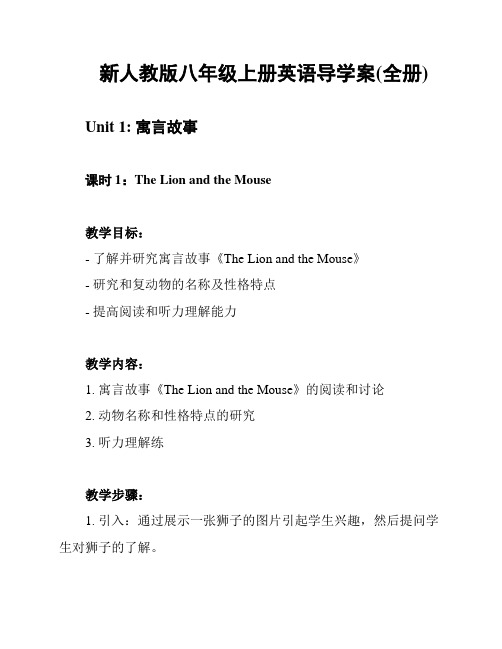
新人教版八年级上册英语导学案(全册) Unit 1: 寓言故事课时1:The Lion and the Mouse教学目标:- 了解并研究寓言故事《The Lion and the Mouse》- 研究和复动物的名称及性格特点- 提高阅读和听力理解能力教学内容:1. 寓言故事《The Lion and the Mouse》的阅读和讨论2. 动物名称和性格特点的研究3. 听力理解练教学步骤:1. 引入:通过展示一张狮子的图片引起学生兴趣,然后提问学生对狮子的了解。
2. 阅读故事:带领学生阅读寓言故事《The Lion and the Mouse》并注重理解故事情节。
3. 讨论问题:让学生回答关于故事的问题,例如:What did the lion do to the mouse? Why did the lion spare the mouse?4. 研究动物名称和性格特点:教授单词lion、mouse等动物名称,并让学生描述它们的性格特点。
5. 听力理解练:播放与故事相关的听力材料,要求学生听并回答问题。
作业:1. 抄写故事《The Lion and the Mouse》的关键句子。
2. 阅读课本上关于动物名称和性格特点的内容并做笔记。
Unit 2: 基础篮球技巧课时1:Dribbling教学目标:- 研究和掌握篮球运球的基本技巧- 提高身体的协调能力和手眼协调能力- 培养团队合作意识和体育精神教学内容:1. 篮球运球技巧的演示和解释2. 练篮球运球的基本动作3. 小组合作练教学步骤:1. 引入:向学生展示篮球运球的动作,并解释其重要性和应用场景。
2. 演示和解释:仔细演示篮球运球的基本技巧并解释每个动作的要点。
3. 练动作:让学生跟随教师一起练篮球运球的基本动作。
4. 小组合作练:将学生分成小组,进行篮球运球的练。
每个小组轮流进行练,其他组员观察并给予反馈。
作业:1. 回顾并练篮球运球的基本动作。
人教版八年级英语上册导学案(全册)
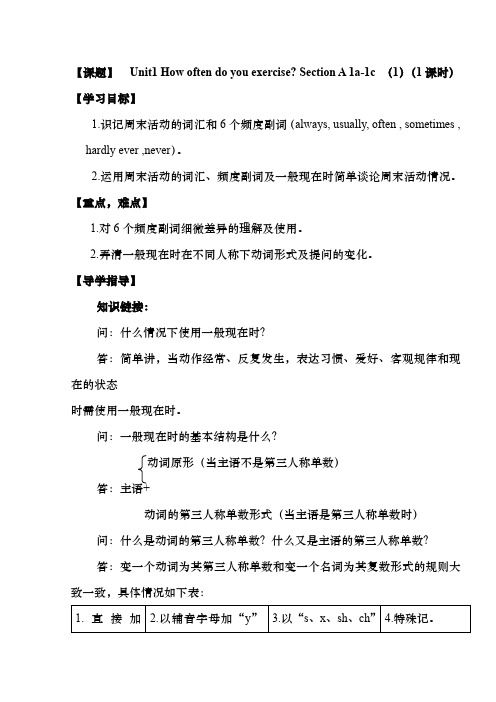
always从不,决不★
often几乎不☆(no star)
2.小组交流学习成果并讨论下列按频率高低顺序排列的表达是否正确(正确写T,错误写F)?若不正确,给出正确表达。
always>often>usually>sometimes>hardly ever>never.____
______>______>_____>______>_______>____.
5.Pair Work Show(展示对话)。
【课堂练习】
一、口译“自主学习一”所列词汇。
二、用所给词的适当形式填空。
1.Do you know Zhang Yining?Her ______(one)name is Yining and she surfs the Internet ______(one) a week.
【课题】Unit1 How often do you exercise? Section A1a-1c(1)(1课时)
【学习目标】
1.识记周末活动的词汇和6个频度副词(always, usually, often , sometimes , hardly ever ,never)。
2.运用周末活动的词汇、频度副词及一般现在时简单谈论周末活动情况。
知识链接:
一、将一个句子变为否定句的三个步骤:1、在要求变为否定句的句子中寻找be动词am、is、are、was、were,若有其中某个的话,在其后边加not即可(也可将其两个词缩写:is not=isn’t;are not=aren’t;was not=wasn’t;were not=weren’t)。2、若在要求变为否定句的句子中找不到am、is、are、was、were,就在其中寻找情态动词can、may、must、should、will、would、could、shall等,若有其中某个的话,就在其后加not即可(也可根据需要将其缩写:can not=can’t,must not=mustn’t, will not=won’t)。3、若在要求变为否定句的句子也找不到情态动词,就借助助动词do、does、did,第三人称单数借助does,不是第三人称单数借助do,一般过去时借助did,并在其后加not(分别可缩写成don’t、doesn’t、didn’t)后边的动词打回原形。
人教版八年级英语上册导学案(全册)

visit museums _______
Step C、考考你的迁移能力
1. Lucy usually______to school early. But today she ______to school late. (go)
2、运用一般过去时谈论过去的一天或一次旅行。
3.不规则动词过去式的归类记忆
【教学过程】
一、导入(启发探究3分钟)
StepA、试一试你能写出下列各词的过去式吗?
stay_________ do_________ stop_________play_________
is_________ go_______ buy_______ have _______
Step 1c
师生、生生操练
Where did you go on vacation? I went to New York City.
Did you go out with anyone? No, No one was here. Everyone was on vacation.
Did you buy anything special? Yes, I bought something for my father.
Step D、answer the questions:
How was your summer vacation ?
Where did you go on vacation?
Who did you go there with ?
What did you do there ?
二、自学(自主探究6分钟)
人教版英语八年级上册答案-导学案-3
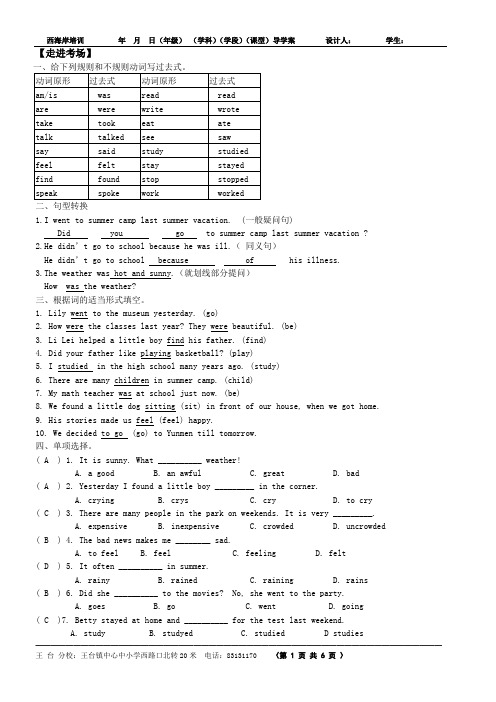
【走进考场】一、给下列规则和不规则动词写过去式。
动词原形过去式动词原形过去式am/is was read readare were write wrotetake took eat atetalk talked see sawsay said study studiedfeel felt stay stayedfind found stop stoppedspeak spoke work worked二、句型转换1.I went to summer camp last summer vacation. (一般疑问句)Did you go to summer camp last summer vacation ?2.He didn’t go to school because he was ill.(同义句)He didn’t go to school because of his illness.3.The weather was hot and sunny.(就划线部分提问)How was the weather?三、根据词的适当形式填空。
1. Lily went to the museum yesterday. (go)2. How were the classes last year? They were beautiful. (be)3. Li Lei helped a little boy find his father. (find)4. Did your father like playing basketball? (play)5. I studied in the high school many years ago. (study)6. There are many children in summer camp. (child)7. My math teacher was at school just now. (be)8. We found a little dog sitting (sit) in front of our house, when we got home.9. His stories made us feel (feel) happy.10. We decided to go (go) to Yunmen till tomorrow.四、单项选择。
八年级上册英语全册导学案(人教版)
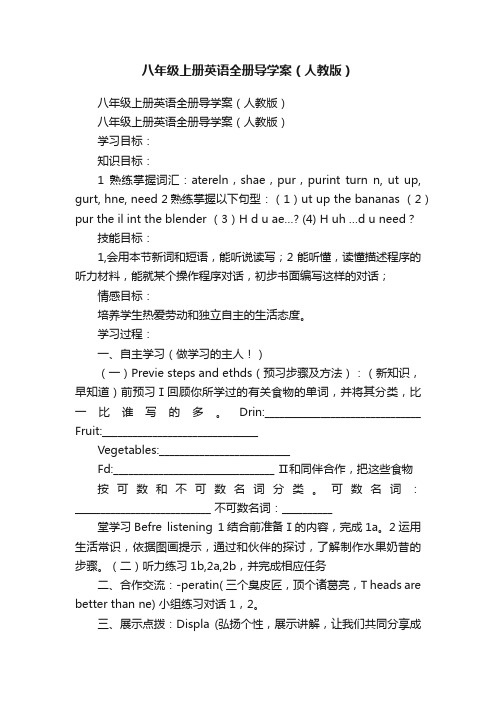
八年级上册英语全册导学案(人教版)八年级上册英语全册导学案(人教版)八年级上册英语全册导学案(人教版)学习目标:知识目标:1熟练掌握词汇:atereln,shae,pur,purint turn n, ut up, gurt, hne, need 2熟练掌握以下句型:(1)ut up the bananas (2)pur the il int the blender (3)H d u ae…? (4) H uh …d u need?技能目标:1,会用本节新词和短语,能听说读写;2能听懂,读懂描述程序的听力材料,能就某个操作程序对话,初步书面编写这样的对话;情感目标:培养学生热爱劳动和独立自主的生活态度。
学习过程:一、自主学习(做学习的主人!)(一)Previe steps and ethds(预习步骤及方法):(新知识,早知道)前预习Ⅰ回顾你所学过的有关食物的单词,并将其分类,比一比谁写的多。
Drin:_______________________________ Fruit:_______________________________Vegetables:__________________________Fd:________________________________ Ⅱ和同伴合作,把这些食物按可数和不可数名词分类。
可数名词:___________________________ 不可数名词:__________堂学习Befre listening 1结合前准备Ⅰ的内容,完成1a。
2运用生活常识,依据图画提示,通过和伙伴的探讨,了解制作水果奶昔的步骤。
(二)听力练习1b,2a,2b,并完成相应任务二、合作交流:-peratin( 三个臭皮匠,顶个诸葛亮,T heads are better than ne) 小组练习对话1,2。
三、展示点拨:Displa (弘扬个性,展示讲解,让我们共同分享成功的喜悦!)Rle pla the nversatins in 1 and 2 Sh t the lasses四、巩固提升:Exerise in lass (别低估了自己的潜力!)根据首字母提示补全单词,使句子完整通顺。
【八年级】人教版八年级英语上册全册导学案
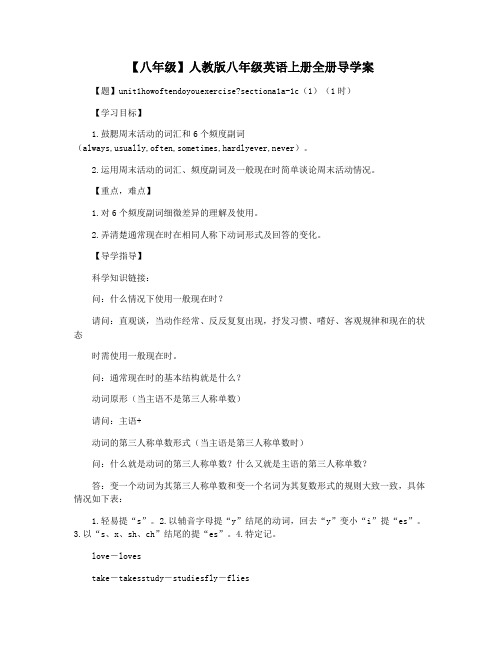
【八年级】人教版八年级英语上册全册导学案【题】unit1howoftendoyouexercise?sectiona1a-1c(1)(1时)【学习目标】1.鼓腮周末活动的词汇和6个频度副词(always,usually,often,sometimes,hardlyever,never)。
2.运用周末活动的词汇、频度副词及一般现在时简单谈论周末活动情况。
【重点,难点】1.对6个频度副词细微差异的理解及使用。
2.弄清楚通常现在时在相同人称下动词形式及回答的变化。
【导学指导】科学知识链接:问:什么情况下使用一般现在时?请问:直观谈,当动作经常、反反复复出现,抒发习惯、嗜好、客观规律和现在的状态时需使用一般现在时。
问:通常现在时的基本结构就是什么?动词原形(当主语不是第三人称单数)请问:主语+动词的第三人称单数形式(当主语是第三人称单数时)问:什么就是动词的第三人称单数?什么又就是主语的第三人称单数?答:变一个动词为其第三人称单数和变一个名词为其复数形式的规则大致一致,具体情况如下表:1.轻易提“s”。
2.以辅音字母提“y”结尾的动词,回去“y”变小“i”提“es”。
3.以“s、x、sh、ch”结尾的提“es”。
4.特定记。
love―lovestake―takesstudy―studiesfly―fliestry―triesfix―fixesteach―teacheswash―washesgo―goes;do―does;have―has而主语的第三人称单数形式是指除了“you(你)、i(我)”以外的所有单个的人或物或者不可数的事物。
独立自主协作自学一、自学:1.仔细观察本第一页图片,根据所给例子核对以下空格。
例:picturea(图a):shopwhatisthegirlinpictureadoing?sheisshopping.pictureb:_______abookwhatisthegirlinpicturebdoing?______________________________picturec:________________________________________?________________________________.pictured:______________________________________________?________________________________.picturee:______________________________________________?________________________________.2.根据汉语提示信息,顺利完成以下其他weekendactivity(周末活动)短语。
八年级英语上册教案导学案全册(人教版新目标)

八年级英语上册教案导学案全册(人教版新目标)人教版八年级英语上册导学案全册Unit1Where did you go on vacationSection A集中识词【学习目标】:1,掌握重点单词的用法2,掌握重点句型:Where did you go on vacation?Did you go anywhere interesting?【学习重点】:一般过去时的复习【课前预习】:看P7,8,完成下列单词:(一个两遍)1. 任何人______________________2. 任何地方____________________3.精彩的__________________4.很少____________________5.大多数_____________________6. 某物;某事__________________7.没有什么____________________8.每人___________________9.我自己__________________________ 10. 你自己____________________11. 母鸡_________________12.猪_____________________________ 13.好像______________________14.厌烦的___________________15.某人_________________________ 16.日记______________________二.完成下列短语:(一个一遍)1. 相当多____________________2. 去度假___________________3.为考试而学习__________________4.照相____________________5.购物_____________________6.记日记__________________________7.当然__________________8.夏令营_________________9.出去___________________________10.第一次______________________11.在农村_________________________的内容,掌握并完成下列知识。
人教版八年级英语上册导学案(全册)

【课题】Unit5 Can you come to my party? Section A 1a-1c(1)(1课时)【学习目标】1.学会邀请别人并根据自己的安排欣然接受别人的邀请或礼貌拒绝别人的邀请。
2.能给出不能接受别人邀请的具体理由。
3.提高自己的听、说能力。
【重点,难点】掌握做出、接受和拒绝邀请的习惯用句;使用“have/has to”给出不能接受邀请的原因。
【导学指导】温故知新一、阅读课本94页“1.动词的种类”及95页上“2情态动词”,完成下列问题。
1.请在横线上罗列5个情态动词。
______________________________________________________________________________2.“must”表示“必须”,否定式缩写为________,其含义为_____________。
若表示“不必,没必要”应该使用_______________或______________。
3.He can play the piano very well.(变为否定句)He _______ play the piano very well.4.I must finish my homework today.(变为疑问句)—______ I finish my homework today?—No, you ________./____________________.二、完成1a的要求(将图片和短语匹配起来)。
然后大声朗读它们。
自主互助学习一、合上课本,试着翻译下列词组。
看看你是不是个健忘的家伙,这些短语可都是曾经的“老熟人”啊!1. 拜访我的阿姨_______________;2. 去看医生________________;3. 帮助我的父母_________;4. 上钢琴课___________________;5. 为考试学习_______________;6.在星期六下午______________。
八年级英语导学案答案
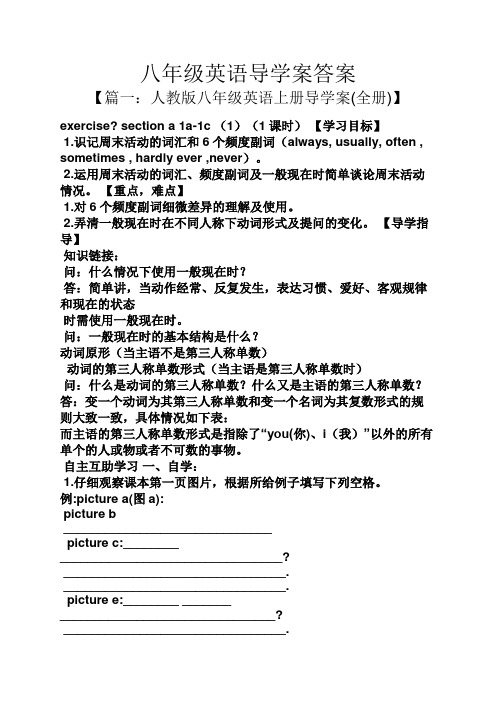
八年级英语导学案答案【篇一:人教版八年级英语上册导学案(全册)】exercise? section a 1a-1c (1)(1课时)【学习目标】1.识记周末活动的词汇和6个频度副词(always, usually, often , sometimes , hardly ever ,never)。
2.运用周末活动的词汇、频度副词及一般现在时简单谈论周末活动情况。
【重点,难点】1.对6个频度副词细微差异的理解及使用。
2.弄清一般现在时在不同人称下动词形式及提问的变化。
【导学指导】知识链接:问:什么情况下使用一般现在时?答:简单讲,当动作经常、反复发生,表达习惯、爱好、客观规律和现在的状态时需使用一般现在时。
问:一般现在时的基本结构是什么?动词原形(当主语不是第三人称单数)动词的第三人称单数形式(当主语是第三人称单数时)问:什么是动词的第三人称单数?什么又是主语的第三人称单数?答:变一个动词为其第三人称单数和变一个名词为其复数形式的规则大致一致,具体情况如下表:而主语的第三人称单数形式是指除了“you(你)、i(我)”以外的所有单个的人或物或者不可数的事物。
自主互助学习一、自学:1.仔细观察课本第一页图片,根据所给例子填写下列空格。
例:picture a(图a):picture b______________________________picture c:________________________________________?________________________________.________________________________.picture e:________ ______________________________________?________________________________.2.根据汉语提示,完成下列其他weekend activity (周末活动)短语。
人教版英语八年级上册 Unit 2 Section A(1a-2e)导学案 (含答案)

人教版英语八年级上册第二单元Unit 2 How often do you exercise?Section A (1a-2d)导学案一、预习目标:1、单词:学习这两页的生词。
2、短语过关:学习关于“做某事的频率”的相关短语。
3、语法:频率副词usually\ often\ sometimes \ never\ hardly ever等。
4、句子过关:How often do you exercise? 你多久锻炼一次?\ I often watch TV. 我经常看电视。
\ I never go shopping. 我从不购物。
\ I watch TV every day. 我每天看电视。
5、积累有关书面表达的句子。
预习导学。
(一)、单词突破——根据下面的提示,写出下列单词的意思。
1、housework ____________2、hardly____________3、ever____________4、hardly ever____________5、once_____________6、twice______________7、Internet_____________8、program_____________9、full________________ 10、swing_____________ 11、swing dance ________________单词讲解:1、housework家务劳动、家务事,不可数名词,常用短语do housework,表示“做家务劳动”。
2、hardly几乎不、几乎没有,表示否定。
3、ever在任何时候、从来、曾经,注意和never(绝不)相区别。
4、hardly ever几乎从不;例如:She hardly ever eats junk food. 她几乎从不吃垃圾食品。
5、once一次、曾经,表示次数;例如:once a month一个月一次。
6、twice两次、两倍,表示次数;例如:twice a year一年两次。
八年级上册英语全册导学案(人教版)
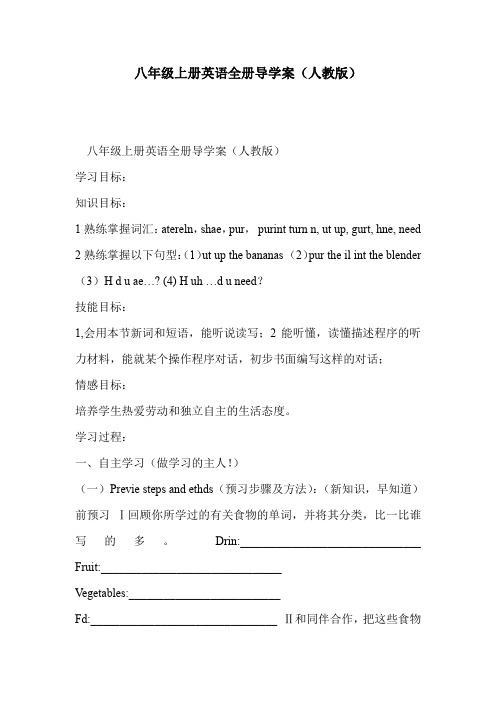
八年级上册英语全册导学案(人教版)八年级上册英语全册导学案(人教版)学习目标:知识目标:1熟练掌握词汇:atereln,shae,pur,purint turn n, ut up, gurt, hne, need 2熟练掌握以下句型:(1)ut up the bananas (2)pur the il int the blender (3)H d u ae…? (4) H uh …d u need?技能目标:1,会用本节新词和短语,能听说读写;2能听懂,读懂描述程序的听力材料,能就某个操作程序对话,初步书面编写这样的对话;情感目标:培养学生热爱劳动和独立自主的生活态度。
学习过程:一、自主学习(做学习的主人!)(一)Previe steps and ethds(预习步骤及方法):(新知识,早知道)前预习Ⅰ回顾你所学过的有关食物的单词,并将其分类,比一比谁写的多。
Drin:_______________________________ Fruit:_______________________________Vegetables:__________________________Fd:________________________________ Ⅱ和同伴合作,把这些食物按可数和不可数名词分类。
可数名词:___________________________ 不可数名词:__________堂学习Befre listening 1结合前准备Ⅰ的内容,完成1a。
2运用生活常识,依据图画提示,通过和伙伴的探讨,了解制作水果奶昔的步骤。
(二)听力练习1b,2a,2b,并完成相应任务二、合作交流:-peratin( 三个臭皮匠,顶个诸葛亮,T heads are better than ne) 小组练习对话1,2。
三、展示点拨:Displa (弘扬个性,展示讲解,让我们共同分享成功的喜悦!)Rle pla the nversatins in 1 and 2 Sh t the lasses四、巩固提升:Exerise in lass (别低估了自己的潜力!)根据首字母提示补全单词,使句子完整通顺。
人教版英语八年级上册Unit 7导学案及答案

Unit 7:Will people have robots ?Section A一、词汇默写1、纸、纸张2、污染、污染物3、预言、预测4、将来、未来5、污染6、环境7、行星8、地球、世界9、种植、植物10、部分11、参与、发挥作用12、和平13、海、海洋14、建造、建筑、体形15、天空16、在人们的家里17、上学18、在家里学习19、在电脑上20、活到200岁21、在100年后22、更少的人23、更少的空闲时间24、更多的污染25、少使用地铁26、我不认为是这样。
27、一本关于未来的书28、听起来很酷29、更拥挤30、处于极大的危险中31、那听起来很糟糕32、不得不33、搬到其它星球34、在地球上35、少用水36、多种树37、拯救地球38、打扫厨房39在将来40、在海里41、做与人相同的工作42、在周末43、蓝天45、新鲜的水二、句型默写(一)展望未来的句子1、未来怎么样?(开头句)(1)在人们的家里将有机器人。
(2)我认为每个家庭将有机器人。
(3)孩子们不要去上学。
他们通过电脑在家里学习。
(4)人们将活到200岁。
(5)我认为将有更多的人。
(6)我认为将有更少的空闲时间。
(7)我认为将有更少的车辆。
(8)将有更少的污染。
(9)我认为将有更少的树木。
(10)城市将更更大,更拥挤,因为有更多的人。
(11)那将对地球有好处。
(12)人们将更多使用地铁。
(13)城市更拥挤和污染。
(14)环境处于极大的危险中。
(15)一切都是免费的。
(16)我们将不得不搬到其它星球。
2、那么我们可以怎么做?(1)我们可以少用水,多种树。
(2)每个人都应该参与拯救地球。
3、其它句型(1)我希望如此。
(2)我希望不。
(3)我不赞成。
(4)我认为是这样。
(5)我不认为是这样。
1三、单元语法讲练:一般将来时1、结构:(1)be going to +动词原形(2)will+动词原形2、标志性时间状语:tomorrow、tonight、next+时间、in+时间段(in two months两个月后、in five minutes 五分钟之后)、in the future (在将来)、soon(不久、很快)、the day after tomorrow等表示将来的时间。
八年级英语导学案答案

八年级英语导学案答案【篇一:人教版八年级英语上册导学案(全册)】exercise? section a 1a-1c (1)(1课时)【学习目标】1.识记周末活动的词汇和6个频度副词(always, usually, often , sometimes , hardly ever ,never)。
2.运用周末活动的词汇、频度副词及一般现在时简单谈论周末活动情况。
【重点,难点】1.对6个频度副词细微差异的理解及使用。
2.弄清一般现在时在不同人称下动词形式及提问的变化。
【导学指导】知识链接:问:什么情况下使用一般现在时?答:简单讲,当动作经常、反复发生,表达习惯、爱好、客观规律和现在的状态时需使用一般现在时。
问:一般现在时的基本结构是什么?动词原形(当主语不是第三人称单数)动词的第三人称单数形式(当主语是第三人称单数时)问:什么是动词的第三人称单数?什么又是主语的第三人称单数?答:变一个动词为其第三人称单数和变一个名词为其复数形式的规则大致一致,具体情况如下表:而主语的第三人称单数形式是指除了“you(你)、i(我)”以外的所有单个的人或物或者不可数的事物。
自主互助学习一、自学:1.仔细观察课本第一页图片,根据所给例子填写下列空格。
例:picture a(图a):picture b______________________________picture c:________________________________________?________________________________.________________________________.picture e:________ ______________________________________?________________________________.2.根据汉语提示,完成下列其他weekend activity (周末活动)短语。
人教版英语八年级上册答案~导学案1

Unit 1 Where did you go on vacation? Section A【学习目标】1.检查并复习音素读音及拼读规则,学会P2-3单词发音2.了解一般过去式3.学会谈论过去的事【要点突破】一、一般过去时的陈述句:主语+动词过去式(+其他)例题:I went (go)to the mountains last weekend.对应练习:1.I stayed (stay) at home yesterday.2.I went (go) to New York City last year.变式练习:(一)写出下列动词的过去式(go went)1.be was/were2.study studied3.watch watched4.eat ate5.have had6.sit sit7.see sawe came (二)用所给动词的适当形式填空1. Jim and Bob came (come) to China last month.2. Li Lei didn’t go (not go) to bed until 12 o’clock last night. So he got (get ) up late.3. Anna read (read) English yesterday morning.4. There was (be) no one here a moment ago.5. I called(call) Lucy this morning.6. I listened but heard (hear) nothing.7. Mary began (begin) to learn Chinese last year.8. Last week we picked (pick) many apples on the farm.二、一般疑问句及回答例题:--Did you buy anything special?--Yes, I did . (I bought something for my father.)(肯定回答)--No, I didn’t . (I bought nothing.)(否定回答)对应练习:1.--Did you go with your friends?-- Yes , I did .(肯定回答)-- No , I didn’t .(否定回答)2.--Did you study for your test?-- Yes , I did .(肯定回答)-- No , I didn’t .(否定回答)三、特殊疑问句例题:--Where did you go on vacation? --I went to the mountains.对应练习:1.-- Who did you visit? --I visited my uncle.考虑:两个visit的意思一样么?2.-- Where did you visit? --I visited museums.【综合练习】(一)用所给词的适当形式填空1. Jack was (be) often late for school last term.2. The dog made the baby cry (make).3. What did you do last night? (do)4. We went (go) to the museum yesterday.5. Lucy wrote(write) two letters to her friends two days ago.(二)认真阅读下列句子, 选出最佳答案.( A )1.How __________ your vacation? - It was pretty good.A. wasB. wereC. didD. is( C )2.Where __________ they go yesterday? They went to the Summer Palace.A. areB. doC. didD. were( B )3. --- Where did you go on vacation? I __________ my grandma.A. visitB. visitedC. visitsD. am visiting( C )4.Betty stayed at home and __________ for the test last weekend.A. studyB. studyedC. studied D studies【挑战中考】1. 按要求完成下列句子,每空一词。
英语八年级上册学案答案

英语八年级上册学案答案【篇一:人教版英语八年级上册答案-导学案-1】acation? section a【学习目标】1.学习section a单词2.分析section a中重点句子结构并掌握所涉及的知识点3.了解一般过去式【要点突破】1.where did you go on vacation?译:(1)--where did you go on vacation? --i went to the mountains.对应练习:①-- whodid you visit? --i visited my uncle.②-- wheredid you visit? --i visited museums.(2)on vacation意为 (holiday)例句:my uncle is in australia on vacation.2. did you go with anyone?译:你和别人一起去的吗?(1)不定代词anyone相当于anybody,当作主语时,谓语动词要用/复数)形式。
例句:excuse me, is anyone in that seat next to you?(2)anyone与any one的区别:前者只能指人;后者既可指人也可指物,表示某一范围中的任何一个,其后可接of.对应练习:用anyone 和 any one of 填空。
① anyone in our school knows him.②you can choose any one of the books.3.did you go anywhere interesting?译:(1)anywhere不定副词,意为“在任何地方”,常用于否定句和疑问句中。
例句:i can’t find my dictionary anywhere.(2)anywhere 与 somewhere 的区别:前者用于否定和疑问句,而后者用于肯定句。
人教版英语八年级上册答案导学案完整版

人教版英语八年级上册答案导学案集团标准化办公室:[VV986T-J682P28-JP266L8-68PNN]【走进考场】( D )1.Peter is good _____ playing football, so he wants to join the football club.A. toB. withC. forD. at( A )2.--What’s your favorite subject--_____. And I always get a good grade in the test.A. PhysicsB. HomeworkC. MovieD. Concert( A )3.There are some differences between Tom and Jim _____ they are twin brothers.A. thoughB. ifC. untilD. so( B )4.This is not Tina’s ruler. _____ is longer.A. She’sB. HersC. SheD. Her( A )5.--How many children do you have, Mrs. Green--A son and a daughter. And they are ___ students now.A. bothB. allC. everyD. each( B )6.I don’t think Henry is _____than Tony.A. much popularB. more popularC. popularD. most popular( C )7.His funny story made all of them _____.A. laughedB. to laughC. laughD. laughs( D )8.My brother is _____ taller than me.A. veryB. tooC. soD. much( B )9.We have many differences, but we also have some things _____.A. in factB. in commonC. as forD. as well( C )10.--I think Holly should get the job. _____--I think Ruth is smarter.A. What’s the matterB. What does she doC. What’s your opinionD. What’s it like( C )11.Simon and Bruce blue eyes.A. hasB. have bothC. both haveD. all have( A )12.He looks thin, but he isthan before.A. thinnerB. more thinC. more strongD. stronger( C )13.Our city is getting .A. beautiful and beautifulB. more and more beautifulC. more beautiful and more beautifulD. much and much beautiful( A )14.My brother always eats junk food, so he is veryA. unhealthyB. healthyC. healthierD. serious( C )15.Diana is notgood at sportsEmma.A. much ... thanB. very ... asC. so ...asD. as ...so( A )16.Can we finish the work withtime andpeople?A. less, fewerB. lesser, fewC. fewer, lessD. little, fewer( D )17.Dennis is noisy. He talksthan his classmates.A. a littleB. a lotC. muchD. more( B )18.Which story is , this one or that one?A. much interestingB. more interestingC. very interestingD. too interesting ( A )19.This box isthan that one.A. a little heavierB. heavyC. little heavierD. so heavy( D )20.Hehis father, and he is good atbasketball.A. like, playingB. looks like, playC. likes, playing theD. is like, playingUnit 4 What’s the best movie theaterSection A【学习目标】1.学习Section A单词2.分析Section A中重点句子结构并掌握所涉及的知识点【要点突破】fortable seats译:舒适的座位comfortable的词性为形容词,意为“使人舒服的;舒适的”。
人教版英语八年级上册答案~导学案2

【走进考场】一、根据句意及汉语提示完成单词1.—How was the movie?—It was wonderful(精彩的).I want to see it again.2.I think nothing(没有什么) is impossible if you work hard.3.Mrs.Green seems (似乎) to be very happy.4.There are lots of hens (母鸡) on the farm.5.I can’t find my ruler anywhere (在任何地方).二、用所给词的适当形式填空1.I didn’t buy anything for myself (I) last night.2.Everyone in my family likes (like) watching TV.3.Do you keep two diaries(diary)?4.We took (take) three photos in our school yesterday.5.Tom read (read) an interesting book last night.三、单项选择( A )1.— did you do last night?—I went shopping.A.WhatB.HowC.WhyD.Where( C )2.Kate______her uncle last night.She did her homework.A.doesn’t visitB.don’t visitC.didn’t visitD.visited( D )3.There are fifty students in our class.30% of them are girls. _______ of them are boys.A.FewB.A fewC.AnyD.Most( B )4.—Did you go to the mountains with______ last Sunday?—Yes, I went with my uncle.A.someoneB.anyoneC.no oneD.everyone( C )5.There is_______with my bike.Can you help me mend it?A.nothing wrongB.anything wrongC.something wrongD.wrong something四、短文填空用所给动词的适当形式填空,完成短文。
导学案英语八年级答案
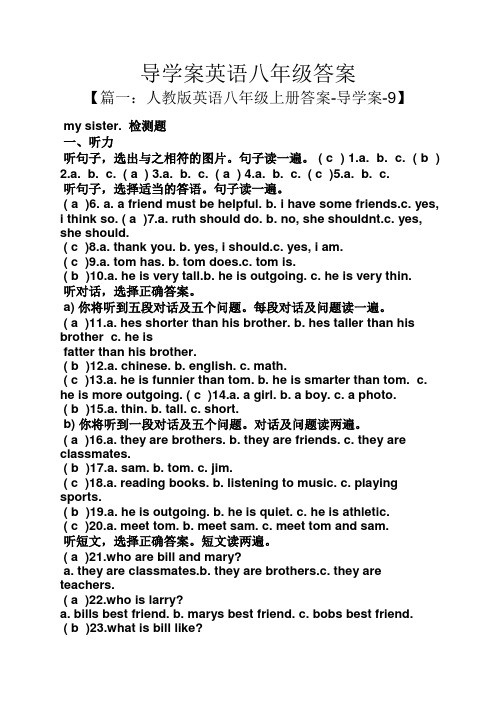
导学案英语八年级答案【篇一:人教版英语八年级上册答案-导学案-9】my sister. 检测题一、听力听句子,选出与之相符的图片。
句子读一遍。
( c ) 1.a. b. c. ( b ) 2.a. b. c. ( a ) 3.a. b. c. ( a ) 4.a. b. c. ( c )5.a. b. c.听句子,选择适当的答语。
句子读一遍。
( a )6. a. a friend must be helpful. b. i have some friends.c. yes, i think so. ( a )7.a. ruth should do. b. no, she shouldnt.c. yes, she should.( c )8.a. thank you. b. yes, i should.c. yes, i am.( c )9.a. tom has. b. tom does.c. tom is.( b )10.a. he is very tall.b. he is outgoing. c. he is very thin.听对话,选择正确答案。
a) 你将听到五段对话及五个问题。
每段对话及问题读一遍。
( a )11.a. hes shorter than his brother. b. hes taller than his brother c. he isfatter than his brother.( b )12.a. chinese. b. english. c. math.( c )13.a. he is funnier than tom. b. he is smarter than tom. c. he is more outgoing. ( c )14.a. a girl. b. a boy. c. a photo.( b )15.a. thin. b. tall. c. short.b) 你将听到一段对话及五个问题。
- 1、下载文档前请自行甄别文档内容的完整性,平台不提供额外的编辑、内容补充、找答案等附加服务。
- 2、"仅部分预览"的文档,不可在线预览部分如存在完整性等问题,可反馈申请退款(可完整预览的文档不适用该条件!)。
- 3、如文档侵犯您的权益,请联系客服反馈,我们会尽快为您处理(人工客服工作时间:9:00-18:30)。
人教版英语八年级上册答案导学案集团标准化办公室:[VV986T-J682P28-JP266L8-68PNN]【走进考场】( D )1.Peter is good _____ playing football, so he wants to join the football club.A. toB. withC. forD. at( A )2.--What’s your favorite subject--_____. And I always get a good grade in the test.A. PhysicsB. HomeworkC. MovieD. Concert( A )3.There are some differences between Tom and Jim _____ they are twin brothers.A. thoughB. ifC. untilD. so( B )4.This is not Tina’s ruler. _____ is longer.A. She’sB. HersC. SheD. Her( A )5.--How many children do you have, Mrs. Green--A son and a daughter. And they are ___ students now.A. bothB. allC. everyD. each( B )6.I don’t think Henry is _____than Tony.A. much popularB. more popularC. popularD. most popular( C )7.His funny story made all of them _____.A. laughedB. to laughC. laughD. laughs( D )8.My brother is _____ taller than me.A. veryB. tooC. soD. much( B )9.We have many differences, but we also have some things _____.A. in factB. in commonC. as forD. as well( C )10.--I think Holly should get the job. _____--I think Ruth is smarter.A. What’s the matterB. What does she doC. What’s your opinionD. What’s it like( C )11.Simon and Bruce blue eyes.A. hasB. have bothC. both haveD. all have( A )12.He looks thin, but he isthan before.A. thinnerB. more thinC. more strongD. stronger( C )13.Our city is getting .A. beautiful and beautifulB. more and more beautifulC. more beautiful and more beautifulD. much and much beautiful( A )14.My brother always eats junk food, so he is veryA. unhealthyB. healthyC. healthierD. serious( C )15.Diana is notgood at sportsEmma.A. much ... thanB. very ... asC. so ...asD. as ...so( A )16.Can we finish the work withtime andpeople?A. less, fewerB. lesser, fewC. fewer, lessD. little, fewer( D )17.Dennis is noisy. He talksthan his classmates.A. a littleB. a lotC. muchD. more( B )18.Which story is , this one or that one?A. much interestingB. more interestingC. very interestingD. too interesting ( A )19.This box isthan that one.A. a little heavierB. heavyC. little heavierD. so heavy( D )20.Hehis father, and he is good atbasketball.A. like, playingB. looks like, playC. likes, playing theD. is like, playingUnit 4 What’s the best movie theaterSection A【学习目标】1.学习Section A单词2.分析Section A中重点句子结构并掌握所涉及的知识点【要点突破】fortable seats译:舒适的座位comfortable的词性为形容词,意为“使人舒服的;舒适的”。
其反义词为uncomfortable,副词形式为comfortably其比较级和最高级分别为more comfortable和most comfortable。
对应练习:翻译句子这些座位比那些舒服。
The seats are more comfortable than those.2.close to home译:离家近close意为“(在空间、时间上)接近”,其反义词为far(远的),同义词为near。
其常用短语be close to 意为“离······近”;反义短语be far from意为“离······远”。
对应练习:翻译句子①My home is close to the zoo.我家离动物园近。
②The bank is far from the station.银行离车站很远。
拓展:close作形容词时还可表示“亲密的”;close作动词,意为“关;关闭”,反义词为open(打开);close作副词,意为“接近;靠近;紧挨着”对应练习:翻译句子①他是我的密友。
He is my close friend.②离开前请不要忘记将窗户关上。
Don’t forget to close the windows before leaving,please.③我住得离学校近。
I live close to school.3.It has the best sound.译:它有最好的音质。
(1)best此处词性为形容词,good的最高级,属于不规则变化,应单独记忆。
其反义词为worst.对应练习:翻译句子约翰是我们班最好的学生。
John is the best student in our class.拓展:best还可作为副词well的最高级,意为“最出色地;最...”。
例句:①Of all the singers,Sam sang best last night.译:昨晚,在所有的歌手中萨姆唱得最好。
②—你最喜欢哪种动物?What kind of animals do you like best?—Pandas.(2)sound此处的词性为名词,意为“声音”。
例句:I like the sound of pages turning.我喜欢翻页的声音。
辨析:sound意为“声音;响声”,泛指自然界能听到的一切声音;voice多指人的说话声、歌唱声等“嗓音”或鸟鸣、虫叫声等;noise指不悦耳的“嗓音;吵闹声”。
对应练习:翻译句子-Can you hear the sound of running water and the voice of the bird?-No,I can’t.I can just hear the noise of men shouting.译:--你能听到流水声和鸟鸣声吗--不,我听不到。
我只听到男士们喊叫的嘈杂声。
4.It’s the most expensive.译:它最贵。
most expensive是expensive的最高级,意为“最贵的”。
多音节(三个及以上)及部分双音节形容词或副词的最高级在词前加most.对应练习:翻译句子这辆汽车是这三辆车中最贵的。
The car is the most expensive of the three.5.It’s the worst store.译:它是最差的商店。
worst此处是形容词bad 的最高级,意为“最差的;最坏的;最糟的”,属于不规则变化,应单独记忆。
对应练习:翻译句子This is the worst book I’ve read this year.译:这是我今年所读过的最糟的书。
拓展:worst还是副词badly的最高级,意为“最差;最坏;最糟”对应练习:翻译句子He danced worst of all.在所有的人当中他跳舞最糟。
6.You can buy clothes the most cheaply there.译:你在那里可以买最便宜的衣服。
cheaply的词性为副词,意为“便宜地;低廉地”。
对应练习:分析cheaply在句子中的成份。
It’s a cheaply made movie. 状语,修饰made拓展:cheap的词性为形容词,意为“便宜的”,其反义词为expensive“昂贵的”。
对应练习:翻译句子这辆自行车非常便宜。
The bike is very cheap.7.The DJs choose songs the most carefully.译:音乐节目主持人选择歌曲最仔细。
(1)choose作及物动词,意为“选择,挑选”。
其过去式为chose ,名词形式为choice。
例句:She chose a book on Shakespeare from the library.(2)carefully的词性为副词,意为“细致地;小心地;谨慎地”。
其形容词形式为careful ,意为“细致的;小心的;谨慎的”。
